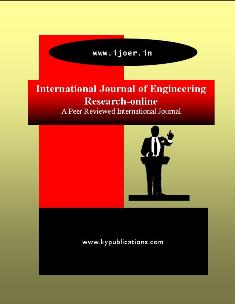ETHICAL GUIDELINES
The
International Journal of Engineering Research-Online
(IJOER) aspire to select and publish, through peer
review, the highest quality research. In order to
achieve this goal, the entire peer review and
publication process should be thorough, objective
and fair.
Journal
reputation depends heavily on the trust by all
stakeholders in the fairness of the peer review and
publication process. A formal code of ethics,
outlining guidelines for good behavior and proposing
solutions to ethical dilemmas facing Authors,
Editors and Reviewers, can build stakeholder trust
and improve journal reputation. With this goal in
mind, the IJOER Code of Ethics is designed to be a
comprehensive policy for peer review and publication
ethics in the Research Journal of English Language
and Literature.
The Code
describes IJOER policies for ensuring the ethical
treatment of all participants in the peer review and
publication process. IJOER Authors, Editors and
Reviewers are encouraged to study these guidelines
and address any questions or concerns to the IJOER
Editor,
editorijoer@gmail.com.
BOPAMS CODE OF ETHICS FOR AUTHORS
Originality:
When an Author submits a manuscript to IJOER, the
manuscript must be an original work.
Authors must not submit the same work, in whole or
in part, to two places of publication at the same
time, or at any time while the manuscript is under
review at IJOER. It is also improper for an Author
to submit a manuscript describing essentially the
same research to more than one place of publication.
Thus, an Author may not submit to IJOER a work that
is in whole or in part under review elsewhere, nor
submit to another publication outlet a work that is
in whole or in part under review at IJOER
Plagiarism:
All work in the manuscript should be free of any
plagiarism or falsification.
Plagiarism takes many forms, from "passing off"
another's paper as the Author's own paper, to
copying or paraphrasing substantial parts of
another's paper without attribution, to claiming
results from research conducted by others. Authors
are expected to explicitly cite others' work and
ideas, even if the work or ideas are not quoted
verbatim or paraphrased. This standard applies
whether the previous work is published, unpublished,
or electronically available. Plagiarism in all its
forms constitutes unethical publishing behavior and
is unacceptable.
In instances the Editor deems as "major" plagiarism,
the paper will be rejected and authors may be barred
from submitting to IJOER for a period of time. In
cases of "minor" plagiarism, the authors would be
asked to rephrase the duplicate sentences.
IJOER
reserves the right to evaluate issues of plagiarism
and redundancy on a case-by-case basis.
Double-Blind Review:
IJOER follows a double-blind review process, whereby
Authors do not know Reviewers and vice versa.
Authors should respect the confidentiality of the
review process and should not reveal themselves to
Reviewers, and vice versa. For example, the
manuscript should not include any self-revealing
information that would identify the Author to a
Reviewer.
Authors should not post their submitted manuscript
(including working papers and prior drafts) on
websites where it could be easily discovered by
potential Reviewers.
IJOER CODE OF ETHICS FOR EDITORS
Independence: IJOER Editors must maintain their editorial independence and work to ensure that Authors have editorial freedom. Responsibility for acceptance or rejection of manuscripts rests with the Editors. Doing so normally entails advice from Reviewers; however, manuscripts that Editors deem clearly inappropriate may be rejected without such review.
